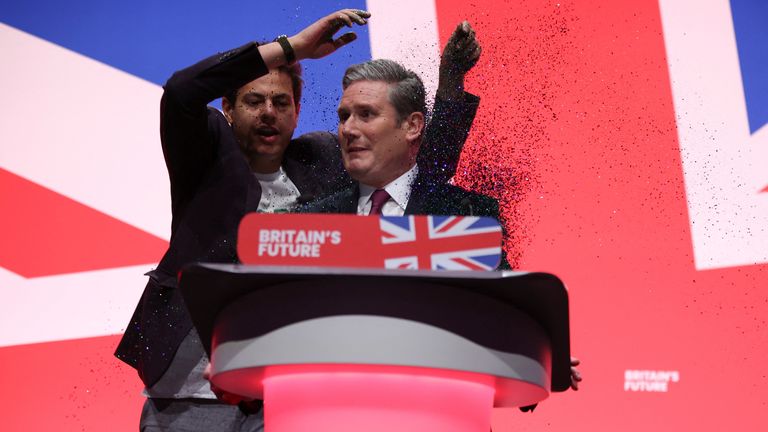It was a leader’s speech received with such defining and raucous applause that Sir Keir Starmer and his wife Victoria, having exited the stage, came back for an encore.
You probably never thought of Starmer as a rockstar politician, but in that hall this cautious, steady lawyer had undoubtedly electrified his crowd.
It was, shadow cabinet minister Thangam Debbonaire told me as the hall cleared, “the speech of his life” – while one of his core team told me they’d cried after he delivered it.
Read more: Starmer makes direct pitch to Tory voters – latest updates from Labour conference
The anxiety giving way to jubilation and relief – a reflection of how much that speech mattered to the party, and the man who wants to become your next prime minister.
The awful start, where a protester threw glitter over the Labour leader could have thrown him off course.
Instead, he took off his jacket and literally rolled up his sleeves to deliver a speech that both spoke of his values and set up the campaigning messages for those Labour supporters to take to the country.
The beginnings of the Labour election slogans were laid out by Starmer as he sought to answer the question “Why Labour?”
His five missions of government were to get Britain building again, switch on Great British Energy, get our NHS back on its feet, take back our streets and tear down barriers to opportunity.
But in truth this was not a speech packed with policies to win over wavering voters. His main pledge on housing – to build 300,000 new homes a year – mimicked what his Tory counterparts have already promised, while Labour’s pledges on police and the NHS had already been made.
That’s because the real aim of this speech was something different. His task was to appeal directly to voters beyond the hall.
Sir Keir had come to his conference determined that it was not enough for the Conservatives to lose. He had to give the public a vision for Britain that was enough for Labour to win a mandate for what he describes as a “decade of renewal”.
His message was one of hope as he told his audience: “What is broken can be repaired, what is ruined can be rebuilt. Wounds do heal. And ultimately that project – their project – will crash against the spirit of working people in this country. They are the source of my hope.”
He did not whitewash the scale of the task as he looked back on the challenges for Labour leaders past.
“If you think our job in 1997 was to rebuild the crumbling realm. That in 1964 it was to modernise an economy left behind by the pace of technology. In 1945 to build a new Britain out of the trauma of collective sacrifice. Then in 2024 it will have to be all three.”
A speech not for the hall, but for the public
The pitch and tone of his speech undoubtedly gave the hall more confidence Sir Keir is determined to replicate the mood of 1996, not 1991 – set to be the heir to Blair, rather than fall short as Neil Kinnock did in 1992 when John Major’s Conservatives narrowly clung on.
Read more:
From glitter protests to collapsing sets – when party conferences go off script
Labour’s ‘tough love’ plan to tackle knife crime
Foreign secretary tells pro-Palestinian protesters to stay home
For this was a speech not for the hall, but for the public. And just like Blair in 1996, Starmer used his moment to appeal beyond his room to the undecided and doubters, to convince the public his party had really changed and was a party that instead of holding people back would help them on.
There were echoes of Blair when Sir Keir promised to prioritise economic growth, work with business, champion a competitive tax regime and back enterprise.
He told the audience he had led a “changed Labour party” no longer in the thrall to gesture politics and protest politics. And to “despairing” Conservative voters, he issued a direct appeal: “If you feel our country needs a party that conserves…you can join it. It’s this Labour party.”
This speech was a pitch from Starmer that he really is the heir to Blair.
He was speaking to a crowd that, after nearly 14 years out of power, is united around a singular goal – to win the next general election.
The mood in the conference centre was certainly more confident after this speech that Sir Keir can lock in the win. I suspect after that speech and its reception, he will be too.



